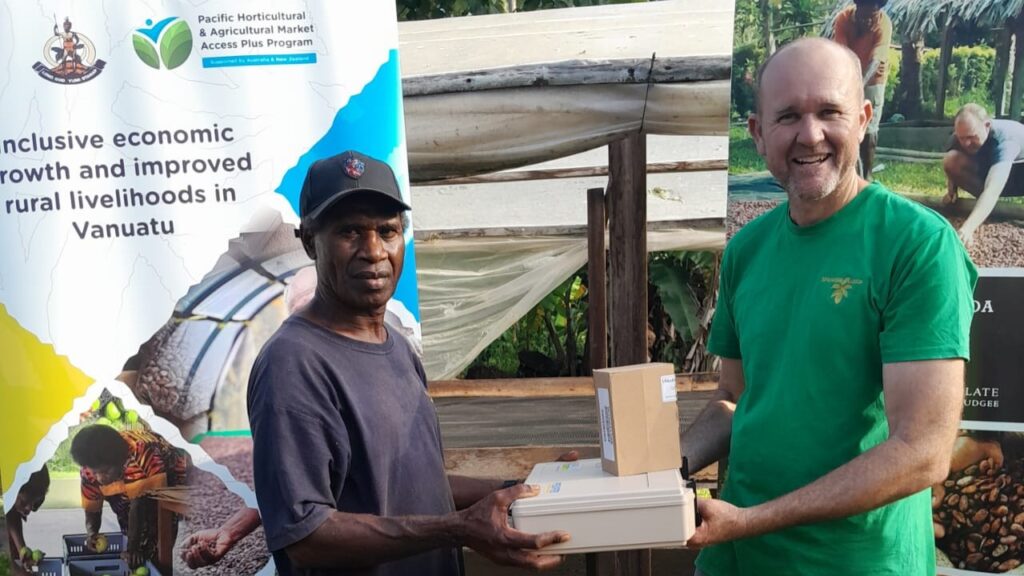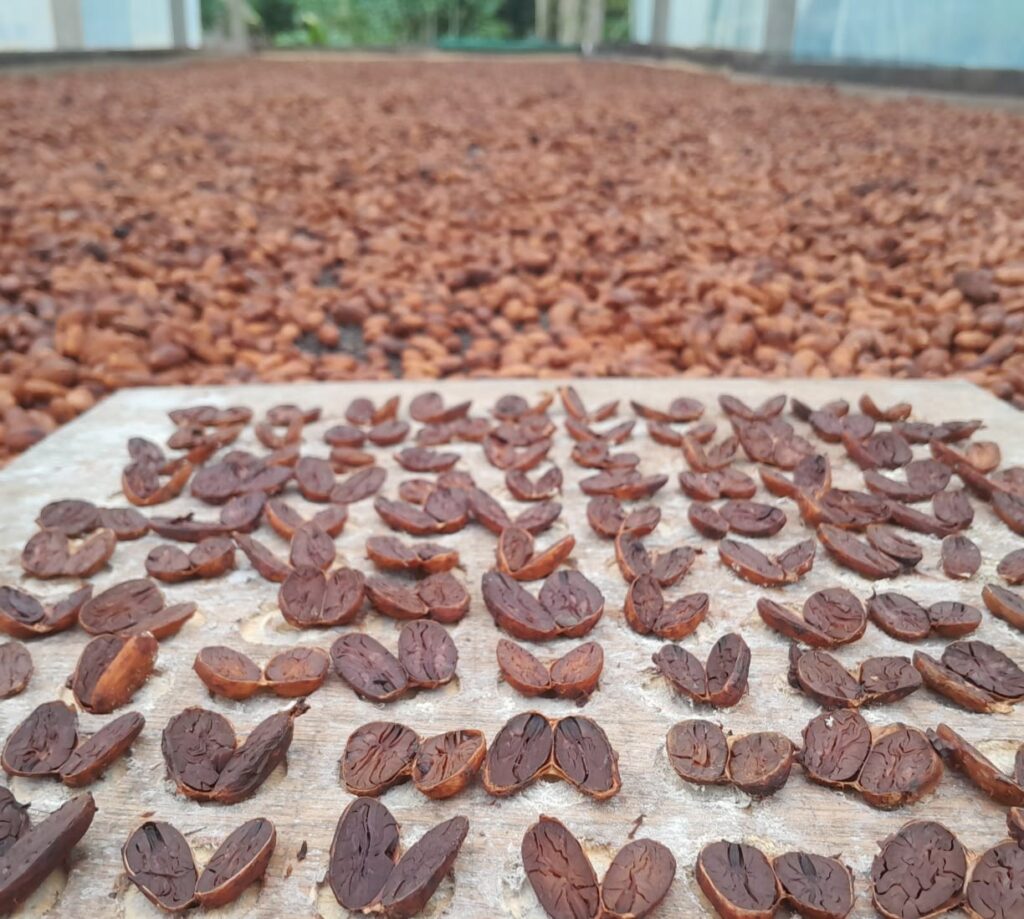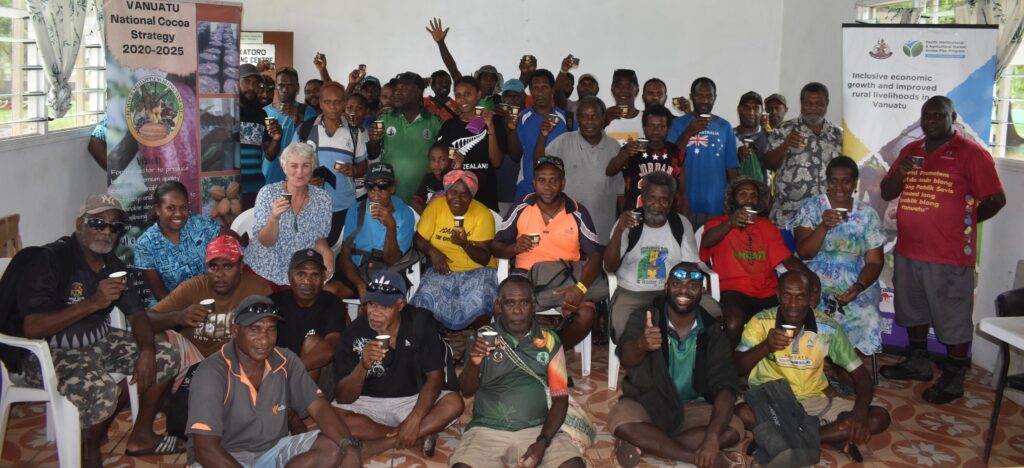A legacy of cocoa excellence: Aisen Tavhabat
Polycarbonate roofing, covering his solar dryer laden with cacao pods, is keeping Aisen Tavhabat smiling these days.
Polycarbonate roofing is a durable, lightweight, and transparent plastic material often used to let in natural light while protecting against rain and UV rays.
Gone are the days of replacing standard ultraviolet light plastic coverings that last only six to twelve moexplnths. Over the years, the cost of these replacements had become a huge financial burden.
The 59-year-old farmer—who owns Aisen Cocoa and hails from Brenwei Village on Malekula Island in Malampa Province, Vanuatu—is a respected farmer of his community.
The Pacific Horticultural and Agricultural Market Access Plus (PHAMA Plus) program, supported by the Australian and New Zealand Governments, assisted Aisen with polycarbonate roofing through its work in Vanuatu.
The roofing upgrade has enabled Aisen to improve the quality of his dried cacao beans and reduce the ongoing costs of replacing plastic roofing.
“The solar dryers with the roofing help us to produce premium cacao beans without the unpleasant smells that often taint lower-quality beans,” Aisen explained.
“The solar dryers are crucial. They give us control over the drying process, and that means better beans.”

Aisen Cocoa is part of a shared factory concept that involves 13 cacao-producing communities, including Epi Island, Malekula, Maewo, Ambae, and Santo.
This model enables farmers to produce premium dried beans and access a HACCP-certified chocolate processing facility at Alternative Communities Trade in Vanuatu (ACTIV), a key intervention partner for PHAMA Plus.
Farmers send their cacao beans to ACTIV, which processes them into chocolate, then sends the finished product back for sale at local markets.
As a lead farmer, Aisen is giving back to his community, training fellow farmers in technical skills and knowledge gained through PHAMA Plus supported trainings.
He works closely with 40 farmers across four communities—Unmet, Anwatak, Uri and Brenwei—and has transformed his farm into a model for sustainable cocoa production.
“Through PHAMA Plus trainings, I have gained valuable knowledge in good agricultural practices, covering everything from plantation maintenance and pest management to financial and post-harvest processes.”
“With this knowledge, I have trained 30-40 farmers, empowering them with skills in farm management, pest control, financial planning and techniques for maintaining premium-quality beans, including replanting, fermentation, drying and proper storage,” he said.
“I have always believed that quality comes from dedication,” Aisen says, his voice thick with the wisdom that only decades of hard work can bring.
Aisen dreams of producing chocolate at Aisen Cocoa.

“If I can’t do it, then I want my children to carry on the dream,” Aisen shares with pride. He has trained his wife and five children, four boys and one girl, in the art of cacao farming.
“I believe women excel here. They pay attention to detail and finish tasks properly,” he notes, encouraging women to take an active role in the industry.
Cacao farming in Vanuatu, like any other industry is fraught with challenges—one of which is financial. However, Aisen remains optimistic and is known to encourage other farmers to remain hopeful.
He has a heart for his community and works for a future where all farmers are applying best practices in cacao production for top-quality beans.
Aisen Cocoa partners with chocolate producer and bean buyer Spencer Cocoa, expanding the latter’s supply base in Unmet, Anwatak, Uri, and Brenwei.
Spencer Cocoa partners with local growers Aisen Cocoa (Aisen Tavhabat) and LRT (Luwi Ross), along with local aggregators, to boost the supply of premium cacao beans for distribution in speciality chocolate markets across Australia, New Zealand, the United Kingdom, and Canada.
Aisen values the partnership with Spencer Cocoa.
“I want to see this industry grow. I want to see more people planting cacao. There’s a lot of land available here, and this is a great opportunity to build a sustainable future for Malekula’s cacao farmers,” he adds.

This intervention supports PHAMA Plus’s goal to contribute to inclusive economic growth and improved rural livelihoods by strengthening Vanuatu’s cocoa industry—an important export sector. It aligns with:
EOPO1: Supporting farmers like Aisen to access and maintain export market access through partnerships with buyers like Spencer Cocoa.
EOPO2 & EOPO3: Building capacity in quality production and innovation (e.g. solar drying, shared processing facilities), and enabling knowledge sharing across farming communities.
ENDS
For more information please contact Country Manager – Vanuatu, Emily Tumukon at e.tumukon@phamaplus.com.au au or Zafiya Shamim, Senior Communications Officer on z.shamim@phamaplus.com.au
